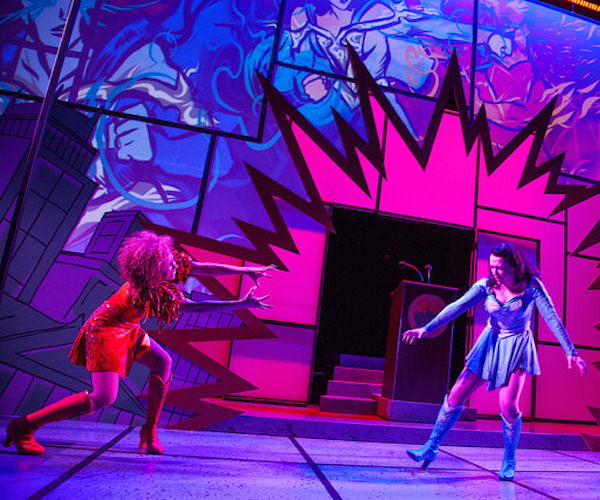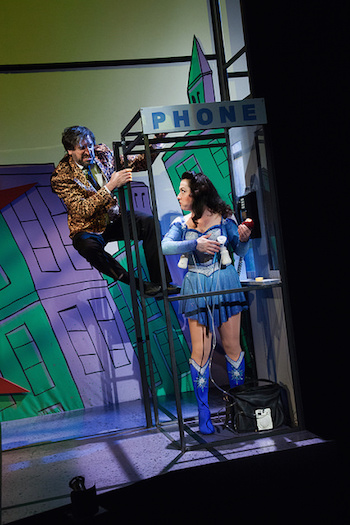Theater Review: “Villains’ Supper Club” — The Adventures of a Supermom
The Villains’ Supper Club supplies an engaging and funny twist on the superhero mythos, plus a smart, refreshing look at the tribulations of working mothers.
The Villains’ Supper Club by Lila Rose Kaplan. Directed by Sean Daniels. Staged by the Merrimack Repertory Theatre at 50 East Merrimack Street, Lowell, MA, through May 20.

Lorene Chesley (Ms. Caliente/The Flame) and Kristen Mengelkoch (Galactic Girl) in the MRT production of “The Villains’ Supper Club.” Photo: Meghan Moore.
By Erik Nikander
One glance at the box office numbers for Avengers: Infinity War should make one thing clear: superheroes have a tight grip on our collective imaginations, and that’s not likely to change anytime soon. Enter The Villains’ Supper Club, a new comedy by Lila Rose Kaplan and the bold, splashy finale (a world premiere production) of Merrimack Repertory Theatre’s season. It’s a yarn about Lydia, a.k.a. Galactic Girl (Kristen Mengelkoch), the world’s last surviving superhero and perhaps the ultimate working mom. Not only does she have to keep her newborn son safe, fed, and happy, but she’s also tasked with saving the world from the clutches of ultimate evil. Needless to say, she doesn’t have much time to relax.
The Villains’ Supper Club may be staged in the era of Disney’s vast, all-consuming Marvel Cinematic Universe, the script has much more in common with two superhero properties of the past. The first is Pixar’s animated hit The Incredibles, which found comedy and humanity by contrasting the mundane with the fantastic. Early in Kaplan’s script, Galactic Girl frantically calls her mother from a phone booth while pumping breast milk through her super-suit. Later on, a late-night trip for groceries is interrupted by a dynamic fistfight with superhuman criminals. Despite her astounding powers, Galactic Girl comes off as human; like any working mom, she has no choice but to balance the demands of motherhood and her job. Even within the stylistic excess of a comic book world, she’s a compelling and sympathetic character.
On a sensory level, the play hearkens back to the colorful camp supplied by the ’60s Batman TV series. Projections by Elizabeth Dombek and illustrations by Chad Cunningham are projected over Apollo Mark Weaver’s jagged, graphic set — the production looks and feels like a pulpy comic book writ large. Arthur Oliver’s costumes supply brilliant color and rich texture, from the animal-print garb worn by Lee the Leopard to Ms. Caliente’s red-and-gold silk dress. The show’s combat sequences, choreographed by Angie Jepson, evoke the vibe of an old kung-fu movie, with dedicated stagehands supporting the actors in midair in place of wires. Director Sean Daniels adeptly weaves together all these potentially-overpowering elements into a cohesive whole, wisely keeping the show’s focus on the human drama.
The demands of motherhood are challenging for Galactic Girl, not least of all because the baby’s father is (spoiler alert!) her old flame, supervillain Lee the Leopard (John Gregorio). Mengelkoch, who was also terrific in MRT’s Lost Laughs earlier this season, emphasizes Galactic Girl’s emotional resilience in the face of soul-crushing stress. Kaplan eschews cliches of airbrushed glamour; Galactic Girl’s feminine strength is an unstoppable force of nature. The actress engagingly balances power and vulnerability. Gregorio discovers a tender middle ground between Lee the Leopard’s primal villainy and his wounded emotional state. The actor’s limber physicality gives Lee a fluid and engaging sense of unpredictability.
The supporting cast of The Villains’ Supper Club (the largest in MRT’s season) also does a great deal to flesh out the play’s world. Lorene Chesley as Ms. Caliente/The Flame is a stand-out; not only is she a formidable opponent for Galactic Girl, she also delivers solid comic relief as The Boss’s baby-crazy girlfriend. Maggie Carr, who plays The Boss, isn’t quite menacing enough to be convincing as the head honcho of a supervillain gang. But kudos for playing the part on roller skates without a hitch—no small feat, especially considering the elaborate fight choreography. Barlow Adamson and Jacob Sherburne are cast as minor supervillains Fibian the Frog and Damian the Dart, respectively. Their flexibility is impressive, given that they also take on various one-note characters.

John Gregorio (Lee the Leopard) and Kristen Mengelkoch (Galactic Girl) in the MRT production of “The Villains’ Supper Club.”Photo: Meghan Moore
However, one of Adamson’s characters generates significant dramaturgical issues. It’s revealed toward the end of the show that our omniscient narrator is actually Brent, a school friend of Galactic Girl’s who had an obsessive crush on her for years. Brent more or less serves as a stand-in for male comic book creators who stereotype and over-sexualize their female characters. At one point, Galactic Girl chews him out for mischaracterizing her story to suit his own ends. While sexism is certainly an issue in comics, addressing it in such a direct (not to mention clunky and preachy) way stops the action dead. In addition, this diversion is confusing; the script indulges in wry, parodic winks at comics storytelling, but there’s been little in the way of heavy-handed objectification. If the story has been filtered from the beginning through Brent’s perspective, then he’s actually presented its female characters as nuanced, complex people!
Brent’s practical role in the narrative is also somewhat confusing. Even though she’s (understandably) weirded out by his obsessiveness, Galactic Girl still trusts Brent to guard her son, Little Johnny. This choice is odd enough but, when Little Johnny is kidnapped by the villains, she’s furious at him! The anger is understandable, but it’s unclear how Galactic Girl expected Brent, an average human being, to fend off a team of villains with superhuman abilities. Given Galactic Girl’s level-headed nature, these scenes don’t make much sense. Still, in a world where people have leopard-based superpowers, it may be wise to expect some narrative loopiness.
Still, despite the occasional storytelling misfire, The Villains’ Supper Club supplies an engaging and funny twist on the superhero mythos, plus a smart, refreshing look at the tribulations of working mothers. Daniels’ direction takes full advantage of the play’s bold visual possibilities. This isn’t the best show in the MRT’s season, but it’s still a striking finale for a slate of distinctive and captivating plays.
Erik Nikander is a critic, playwright, and filmmaker based in the New England area. His film criticism can be read on Medium and his video reviews on a variety of topics can be viewed on Youtube at EWN Reviews.
Tagged: Lila Rose Kaplan, Merrimack Repertory Theatre, Sean Daniels
